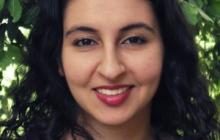Each year the University of Washington (UW) honors a select group of faculty members for their work with undergraduate and graduate students. Nominees for the Distinguished Teaching Award are evaluated on several criteria including knowledge and mastery of subject matter, innovation in course and curriculum design, and ability to inspire students through independent and creative thinking. The award is the top teaching honor at the UW.
One of this year’s awardees, Dr. Arbella Bet-Shlimon, is a professor in the Department of History. She is the 13th History faculty member to receive the award, the most of any department on campus. Bet-Shlimon holds a bachelor’s degree in English from the University of Washington, a master’s degree in Middle Eastern studies from the University of Michigan, and a doctorate in History from Harvard University. Her scholarship is focused on the politics, society and economy of twentieth-century Iraq and the broader Persian Gulf region, as well as Middle Eastern urban history.
Bet-Shlimon teaches a variety of courses at the UW, which range from a survey of modern Middle Eastern history at the 100 level to a more intense seminar version of that course for graduate students. She also offers a hybrid lecture-seminar for more advanced undergraduates and graduate students that is a survey of the modern history of the Persian Gulf region. In all of her classes, regardless of size, Bet-Shlimon aims to have a personal impact on each student’s education, emphasizing back-and-forth conversations, as well as questions and brainstorming.
Primary sources, such as novels, audio clips, political manifestos, visual sources and more, play a key role in her teaching. One course, for example, Identity and Politics in the Modern Middle East, is based entirely on primary source materials, offering students a unique opportunity not only to engage with the past, but also to do the work of historical interpretation themselves during each class session.
Current events, contextualized by weeks of historical study, also enter into readings and discussion. For example, in her 100-level survey offered during Winter 2017, Bet-Shlimon required her students to write a "Letter to the Editor" as their final writing assignment. As a first step, students had to find an article published within the last year in a major newspaper and then respond to it (in letter form) with citations of course materials. The goal of the project, according to Bet-Shlimon, was “to demonstrate how what they were reading in the news could be critiqued, affirmed, or supplemented with an understanding of modern Middle Eastern history.”
Bet-Shlimon is currently completing a manuscript on the history of Kirkuk, a disputed, highly diverse, and multilingual city in northern Iraq that has long been a center of the country’s oil industry. In recent weeks, a controversy has raged over the raising of the Kurdish national flag in front of government buildings there, which, Bet-Shlimon explains, “has Kurdish nationalists emboldened and non-Kurdish Iraqis extremely angry. There have been dueling demonstrations and even clashes in the streets.” The goal of her research project, which covers more than a century, is, in her words, “to show how we got here, and what oil had to do with that process. I argue that British colonialism, oil urbanization, and Baghdad's exclusionary politics of integration created ethnic fragmentation."
Spending so much time immersed in a topic has influenced Bet-Shlimon’s approach to teaching. She cites her work on Kirkuk, for example, as one reason for using “urbanist lenses” as a way to explore topics ranging from the performance of politics in public spaces to nationalisms and questions of political identity. Kirkuk also serves as a vibrant illustration of how knowing the histories of a place and its residents is vital to understanding contemporary conflicts and power dynamics.
As lucky as the UW Department of History is to have Bet-Shlimon as a member of its faculty, her eventual decision to become a historian was, she explains, “the result of an accident." While completing her master’s degree in interdisciplinary Middle Eastern studies at the University of Michigan, Bet-Shlimon had a chance run-in with an advisor that changed her scholarly trajectory. "I had taken a very broad smorgasbord of classes and didn't have a clear self-identity as a researcher. I knew I wanted to research Iraq and that I was generally interested in issues related to oil and politics, so I decided to ask the University of Michigan's main specialist in Iraq, a history professor, to be my advisor. The first time I went to his office hours, he was in a hurry and mistook me for a history graduate student, and before I could clarify that I wasn't the person he was thinking of, he suggested some thesis topics that were historical in nature and ushered me out. That is how it happened, in all seriousness. Once I sat down with some of the microfilm reels he'd suggested and started hammering out my thesis topic, I realized that historical methods were the right approach for me as a scholar - capacious, contextualized, and interdisciplinary in their nature. In other words, the process of primary research made me a historian in a way that history classes had not.”
The Department of History congratulates Professor Bet-Shlimon on being honored with a Distinguished Teaching Award.
